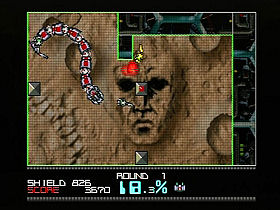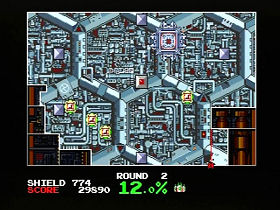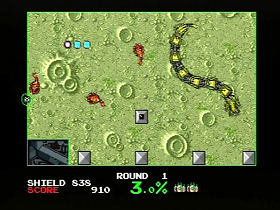
 The Game: Players control a ship capable of claiming area of the screen by “drawing” boxed-in enclosed spaces. The catch? Numerous enemies roam around the screen who want to keep this from happening, and naturally they pose the greatest threat when the player’s ship is exposed while it tries to “draw” an area. Anytime the player’s ship is away from a solid area, hanging by a thread, it can be destroyed. The player has shields that offer minor protection, but they can eventually be depleted entirely. The player has to claim enough of the screen that it equals or exceeds a pre-determined percentage of the screen area, and then the long, drawn-out battle begins anew. With each new level comes a new enemy with different offensive capabilities, until the player’s small fleet of ships is exhausted. (Mad Duck / Taito, 2003)
The Game: Players control a ship capable of claiming area of the screen by “drawing” boxed-in enclosed spaces. The catch? Numerous enemies roam around the screen who want to keep this from happening, and naturally they pose the greatest threat when the player’s ship is exposed while it tries to “draw” an area. Anytime the player’s ship is away from a solid area, hanging by a thread, it can be destroyed. The player has shields that offer minor protection, but they can eventually be depleted entirely. The player has to claim enough of the screen that it equals or exceeds a pre-determined percentage of the screen area, and then the long, drawn-out battle begins anew. With each new level comes a new enemy with different offensive capabilities, until the player’s small fleet of ships is exhausted. (Mad Duck / Taito, 2003)
Memories: Marketed in the U.S. as Qix Neo, this game is actually the U.S. localization of a budget PS1 port of a Japanese arcade game vaguely related to Qix, Volfied. (Playing “Qix Neo“‘s “original” mode even shows the intro cutscene from Volfied, unchanged from the arcade edition.) But for fans of Qix, Qix Neo is close enough to the mark to count as a sequel.
 As with most Japanese-originated arcade game ports, Volfied, erm, Qix Neo is available in two flavors: “original” and “arrangement.” The original mode is essentially untouched from the arcade version of Volfied, which the arrangement mode is considerably tougher. Even getting fairly good at the original mode doesn’t guarantee survival in the arrangement mode.
As with most Japanese-originated arcade game ports, Volfied, erm, Qix Neo is available in two flavors: “original” and “arrangement.” The original mode is essentially untouched from the arcade version of Volfied, which the arrangement mode is considerably tougher. Even getting fairly good at the original mode doesn’t guarantee survival in the arrangement mode.
If there’s a single gripe with this game, it’s that it sticks to the formula that most versions and variations of Qix have followed since the late 1980s: only one drawing speed, and the point of the game is to reveal a picture by claiming territory on the screen. Unlike most of those variations on the basic Qix formula, however, the picture revealed becomes the background of the next  level – and in some cases that means a very busy screen image that makes navigation, or determining the position of enemies, a challenge
level – and in some cases that means a very busy screen image that makes navigation, or determining the position of enemies, a challenge  at best.
at best.
Still, Qix Neo shows its classic roots clearly, and is solidly playable as one of the last entries in the brief spurt of re-imagined classics that hit the PlayStation between ’99 and the early 2000s. (Ironically, Volfied appears under its own name in the PS2 Taito Legends compilation.)